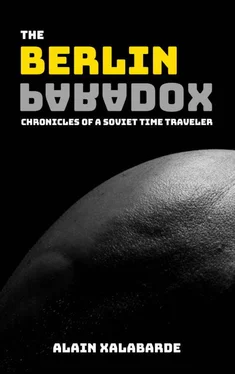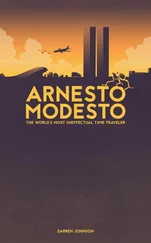I ask him if that’s why there was a dead instance of myself in that bunker. He takes a breath and specifies that the body isn’t me, it’s him. There are now two dead instances of himself lying inside that bunker.
I ask him what happened to the rotting corpse. How did he get here? He says the only explanation is that the corpse is the outcome of his final trip. The ultimate last trip. The bunker is impenetrable, that’s why they had to blow it open. It is very likely that there was nobody to get him out and that he died of starvation. He speaks of this in a cold tone, as if he were speaking about someone else.
If that’s the case, he remarks, he has failed his mission. No matter how much he travels, that will be his ultimate fate. I ask how he knows he has failed. He says that if he hadn’t failed, he wouldn’t have made that last trip in the first place.
It’s quite a lot of information for me to process, and half of my questions are still unanswered. I ask him who he works for. He tells me it depends who you ask. This answer doesn’t help.
He says that, when he left us in Konigsberg, he moved back to Berlin to work for the Nazi regime. That’s where the experiments began. Shortly after, however, he made discoveries which urgently changed his point of view. I ask if he turned to the Soviets. He nods at first, but then quickly shakes his head. Apparently it’s more complicated than it seems.
I remember him leaving. I was very little, but I remember it well. Above all, I remember his absence. I remember his alleged death. I remember the struggles my mother had to endure on her own. I remember the day we had to abandon everything and flee from the advancing Soviet forces, her own people, after hearing the atrocities they had committed upon the people in Nemmersdorf. I remember the following months in Poland. I remember little from the village, but I remember much of the language. I remember returning home, to Konigsberg, now Kaliningrad. I remember how different it was. It was unrecognizable. It had fallen into utter decay. All you could find were prostitutes and smugglers. It’s as if the worst of Russia had fled the mainland to infect this young city with corruption. The only citizens I could look up to were the soviet soldiers stationed there. Fortunately my mother made sure we fit in quickly. She was a Russian after all, and a survivor above all.
I want to tell my father of all this. I want to recriminate my father for it. But I know it is of no use.
Instead I pace from one side to the other, trying to make sense of all the pieces. I ask if he was the one who killed Dr. Vodnik. I immediately follow up with another question; whether he killed Burak as well.
He nods in shame. He insists that things are more complicated than they seem. He insists that the technology is far too dangerous for the Soviets to get hold of. The doctor was too smart for his own good. He got too close to cracking its secrets, and it would have been disastrous if he did.
I cannot trust this man, yet I feel guilty for not doing so.
He opens his shirt and shows the numerous scars and marks on his body. He asks me if I know what they are. I shake my head. He says they’re all seeds. Travel seeds. He cut them into his skin so they would scar and therefore be able carry them with him when travelling. He notes that he has used every single seed. He has travelled for over ten years. Ten real years. And he has seen too many things go astray.
I notice that some areas of his body are completely scratched off, making the seed unreadable. He notices. He says those are places no one should never revisit.
He warns me that I do not want to end up like him. What’s worse, I don’t want to see what the world will be like in the near future. This last sentence catches my attention. I ask him what he means. He responds by saying that the future holds a most unfortunate tragedy. I tell him I have been to 1990. Nothing seemed wrong. He says he isn’t talking of 1990, but of the 2000s. I am afraid to ask, but he nevertheless answers my silent question. He says that, even though the nazis were never able to fully deploy their original plan for the time program, they were successful in generating a catastrophic anomaly at the start of the new millenium. I ask him for details, but he insists in keeping them to himself. What he does divulge, however, is that it is my responsibility to prevent it. How? Why not him? He specifies I must travel back to 1943. Smack in the middle of the Third Reich? He must be kidding. He says he cannot return himself. They know who he is. By that time he’ll have betrayed the people involved in the experiment and they’ll be hunting him down. What’s more, an earlier version of himself, a nazi-sympathizing version, would surely shoot him on sight. He needs someone new. Someone they can give the benefit of the doubt. It’s the only chance.
The plan sounds mad and plain stupid at the same time. For all I know, this could simply be a trap.
My father buttons up his shirt. He runs his hand through his hair and sniffs. His eyes are piercing into my head.
No reason to trust him. Absolutely none.
My father has taught me much about what to expect in 1943, but I don’t feel ready. Luckily, I don’t need to travel all the way back to 1940. Three years trying not to get murdered in Nazi Germany. No, thanks. As an insider, he has access to a variety of dates, so I’ll be arriving just in time, for once.
The fat man who let us into his apartment doesn’t seem to like me. That’s fine. I don’t like him much either. I confirmed my suspicions that he is a nazi enthusiast. He only helps my father because he sees him as a hero. Poor idiot. He has no idea where my father stands. Then again, neither do I. Maybe I’m the idiot.
I haven’t had a day to rest. My father insists that it’s urgent. Every day I spend here is a day I spend in danger. I am his last hope and I my safety cannot be undermined.
We make our way to the center, in a rush. My father parks near the zoo and we walk. We stroll the same area I will stroll in ten years. The Hochbunker on Pallasstraße looks exactly the same, except for the graffitis; they’re are always changing.
To my surprise, my father walks towards the entrance bunker. Only now do I notice a strange man standing by the door. He nods and opens the main door for us. There is nobody else inside. Only us. My father cruises through the bunker as if it were his own home. He has been here before. Many times. I feel like a newbie being shown around the job by a veteran.
A few minutes later we are deep underground, uncovering doors that would be invisible to the naked eye. We enter the now-familiar laboratory, holding one more iconic time booth in its corner. This laboratory seems much better maintained than all the others I’ve seen. My father says he’s made sure to keep this one functioning properly, but it has proven to be a challenge to keep it a secret from the Soviets.
I peep over the documents that are pinned to the wall. Among them I see a map that makes my heart jump. In it are what seems to be the location of all bunkers. It all make sense now. Two hexagons, one smaller than the other. One labelled A, the other B. My father skims through the details but explains that the shape was part of why the time travel was possible. In fact, the more hexagons and the farther apart they are, the further you can jump in time. However, we are still limited to the existence of the time booths. In other words, we cannot travel before 1939, when the first hexagon was built.
If only Dr. Vodnik was here to see all this. It would blow his mind.
In the center of both hexagons is a red pin, right above Friedrichstrasse train station. It marks the place my father had spoken about last night while going over the mission details. The answer to the permanent and wireless energy source was hiding under this location. If I could destroy that, it would render the whole program obsolete. It would effectively halt all operations. The Time Program had spent two thirds of their entire budget on this single site alone. Nobody would put up the money or effort to rebuild it. Not in times of war. This power source made creative use of Tesla’s principles and brought them a step further. If my father’s plan is successful, the whole technology would be lost in time, burned along with all records of the Nazi Time Program.
Читать дальше











